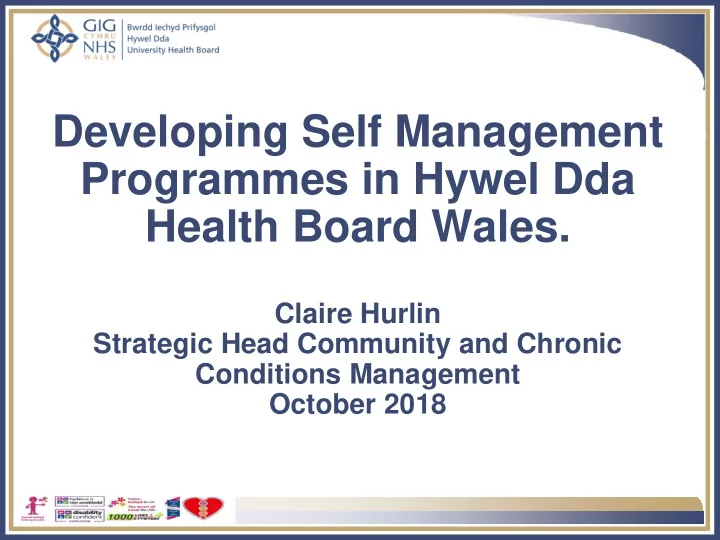

Developing Self Management Programmes in Hywel Dda Health Board Wales. Claire Hurlin Strategic Head Community and Chronic Conditions Management October 2018
Hywel Dda Health Board
Some Facts ⚫ Number of people aged 65 and over are projected to have increased by 32% from 2010 in 2026 ⚫ Wales has a higher proportion of reported limiting long-term illness (23%) compared with England (18%), Scotland and Northern Ireland (20%) ⚫ One third of adults report having at least one chronic condition ⚫ Three quarters of over 85 year olds report having a limiting long-term illness ⚫ Intensive users of inpatient services have on average 3 chronic conditions ⚫ By 2030 Wales will have an increase of 10.38% of people with a diagnoses of diabetes which equates to 39,444 people
Self Management ⚫ ....... includes all the actions taken by people to recognise, treat and manage their own healthcare independently of, or in partnership with the healthcare system. ( supporting self management National Voices 2014)
What does the evidence say? Cost effective ⚫ Self management programmes save on average £452 /patient/year Reduces burden on professional time ⚫ Peer-led self management It works ⚫ Improves clinical outcomes – Improves clinical symptoms – Improves quality of life. – Supports patient participation at all levels ⚫ Improves interactions between clinicians and patients – Voluntary roles – £1 invested around £6.50 of social value created –
COPD-Chronic Obstructive Pulmonary Disease ⚫ COPD Self Management for Life ⚫ EASE-Self-reported outcomes of a self- management programme for Chronic Obstructive Pulmonary Disease: A focus group study ⚫ COPD+ and COMPACT COMmunity based Pulmonary rehabilitation progrAmme for patients with mild to moderate Chronic obsTructive pulmonary disease?
• Why MRC 1 and 2 ⚫ Earlier you start the better the outcome? ⚫ COPD Self Management for Life ⚫ Most would like course when diagnosed 1 ⚫ Creation of COPD+ 1. EASE report (SU)
COPD+ Licenced with Self Management UK ⚫ 9 weeks – pre test – 7 weeks (1 hr exercise, break, 1 ½ hrs education) – post test ⚫ Introduced to Breathe Easy ⚫ Sign up to NERS 16 week programme
Week 2 - 8 education sessions: ⚫ What is self management? ⚫ Handling challenging and unhelpful emotions ⚫ What is COPD? ⚫ Managing our ⚫ Balancing Life with COPD breathlessness ⚫ Goal setting ⚫ Socialising with COPD ⚫ Planning for action ⚫ Managing our medication ⚫ Physical activity and COPD ⚫ Being positive ⚫ Pursed lip breathing ⚫ Managing COPD ⚫ Sleep exacerbations or setbacks
⚫ Group A Participants that complete at least 5 / 7 sessions of ‘ COPD+ ’ ⚫ Group B Participants awaiting ‘COPD+’ or live out -of-area
Conclusions ⚫ Both groups typical of Pre-Pulmonary Rehabilitation and comparable at baseline (Controls slightly higher ISWT) ⚫ COPD+ was safe and popular ⚫ At 9 weeks: COPD+ was associated - improved CAT (statistically & clinically relevant) - improved EQ-5D (statistical, clinical) - no change BORG - improved ISWT (statistically & clinically relevant)
Participants comments: “A great course, really enjoyable and fun” “.. well presented in a relaxed informative way. It has given me more confidence because of my achievements” “A benefit to help with my condition”
DSMP-Diabetes Self management Programme
Diabetes Self Management Education Stanford University DSMP – delivered for 2½ hours/week for six weeks, in community settings by lay person tutors. Study aims • Assess the feasibility of conducting a large pragmatic randomised control trial to assess the effectiveness of the DSMP in a Welsh population; • To explore a range of factors that could be used to improve the delivery of the DSMP.
Protocol & outcome measures • DSMP Questionnaire Stanford evaluation Tools • Diabetes Empowerment Scale-Short Form (DES- SF) • Summary of Diabetes Self Care Activities (Diabetes Care 23:943 – 950, 2000) • Health Questionnaire • EQ-5D-3L • Focus groups & patient letters • HbA1c (DCA 2000 Analyser)
Diabetes Self Management Education ➢ 12.4% enrolled over the 7- 485 eligible patients month period (August 2014 - identified centrally February 2015) ➢ 41% participants attended the final six-month data collection ➢ appointments were kept to 10- minute slots ➢ Questionnaires took between 10 and 30 minutes to complete ➢ Questions with poorest response rates were testing blood sugars and foot care
Diabetes Self Management Education Patient Letters… “I found the course extremely informative and helpful and the lecturers delivered the course in a very professional way. As the lecturers themselves had diabetes, it made the whole progress seem as if these people knew exactly how we were feeling and that these problems could be solved” ”With the excellent tutors breaking it down into bite size pieces over the six weeks I was able to understand how I could take control of my diabetes. I would highly recommend this course”
Observations… DSMP Self-efficay: greatest improvement in DSMP • Diabetes Empowerment Scale-Short Form (DES-SF): DSMP Increased • vs no change Summary of Diabetes Self Care Activities (Diabetes Care 23:943 – 950, • 2000): DSMP increased vs unchanged or decrease DSMP Health Questionnaire: greatest reduction in DSMP depression • EQ-5D-3L: DSMP health score increased vs unchanged • Focus groups & patient letters: Positive • HbA1c (DCA 2000 Analyser): 0.1% increase in DSMP & 0.6% in control •
Outcomes ➢ Findings indicate benefit of DSMP on outcomes ➢ Tutors felt confident delivering material ➢ Tutors were well received ➢ DSMP will form part of tiered approach to patient education Information leaflet Film package DSMP XPERT
Technology Gwelwch y ffilmiau hyn am diabetes fel rhan o’ch triniaeth. Please watch these films about diabetes as part of your treatment. Click this link for prediabetes: www.medic.video/h-pre For Type 2: www.medic.video/h-type2 For Type 1: www.medic.video/h-type1 For Gestational: www.medic.video/h-gest Gwelwch y ffilmiau hyn am COPD fel rhan o’ch triniaeth. Please watch these films about COPD as part of your treatment. Click this link www.medic.video/h-copd www.medic.video/h-exercise
Many thanks Any questions? Claire.hurlin@wales.nhs.uk
Recommend
More recommend